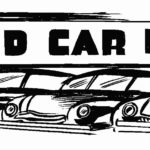Buying a Used Car
Begin with knowing what you need in a car and what you want. Know your price range, know your financing options; know the value of your car. Do your homework.
Again you can use the internet to search what is available. With used cars, your mechanic may be able to steer you towards cars that require less maintenance. They see what comes into their shop – ask them what they would buy given your list of needs.
Certified Pre-Owned cars may offer your best deals. Manufacturers have programs where they will refurbish a car and give extended warranties. Usually there are a limited number of years or miles the car can have. The first years of depreciation has already occurred. For the price, the car can be a good deal with extended warranties.
Buying from a dealership may provide some warranties. Be sure you have any promises in writing. The Federal Trade Commission (FTC) requires dealers to post a Buyer’s Guide in every used car.
The Buyers Guide must tell you:
- whether the vehicle is being sold “as is” or with a warranty
- what percentage of the repair costs a dealer will pay under the warranty
- that spoken promises are difficult to enforce
- to get all promises in writing
- to keep the Buyers Guide for reference after the sale
- the major mechanical and electrical systems on the car, including some of the major problems you should look out for
- to ask to have the car inspected by an independent mechanic before you buy
Review a car dealer you may use. Check with your Better Business Bureau and/or the Attorney General’s Office to see if there are unresolved complaints on file.
Check the history of the car. Get the Vehicle Identification Number (VIN) from on top of the instrument panel at the base of the windshield. Confirm the VIN from the sticker on the driver’s side door pillar.
With the VIN, you can use various resources to check the history.
- US Department of Transportation Vehicle Safety hotline (1-888-327-4236) for information on recalls.
- National Motor Vehicle Title Information System (NMVTIS) offers information about the vehicles title, odometer data and certain damage history.
- Car Fax
- Experian Automotive
These sources will require a fee of $15 for a report.
When you think you have found “the car”, be sure and have a reputable mechanic check the car out. This may be a $100 fee – “A case of an ounce of prevention is worth a pound of cure.”
Resources to tell you what to look out for in a used car can be found at:
Kelley Blue Book – 10 steps to Buying a Used Car.
Consumer Reports – How to Spot a Lemon.
Are you ready to make the purchase? Determine the value of the vehicle before you negotiate the purchase price. Check websites like National Automobile Dealers Association’s (NADA), Edmunds and Kelley Blue Book.
Do your homework! It will pay you dividends. Your mechanic can tell you the stories of those who didn’t do their homework.


